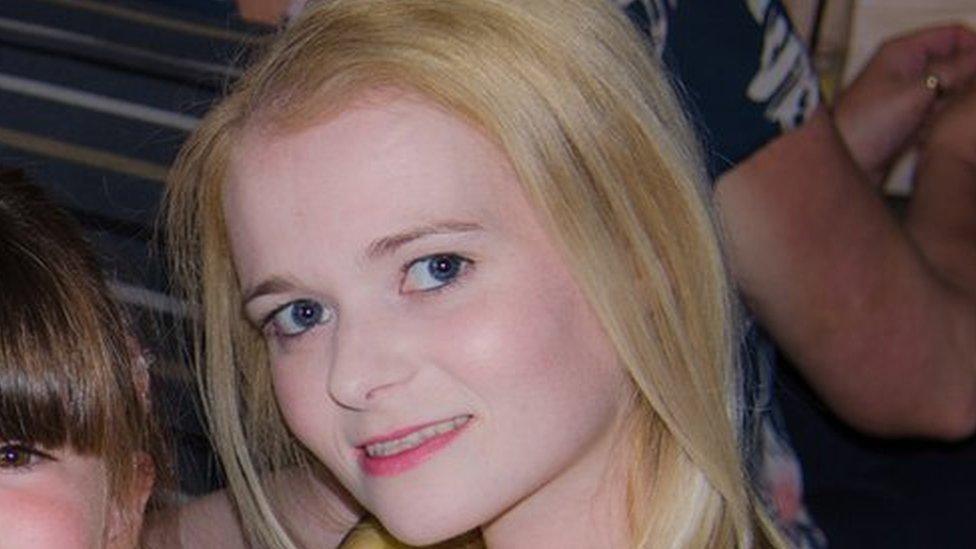Inquest hears of hospital ‘panic’ before mum’s death

Laura Higginson died in Whiston Hospital in April 2017
- Published
The husband of a woman who died days after being mistakenly overdosed with paracetamol in hospital sobbed in court as he described her final days.
Laura Higginson, 30, who died on 19 April 2017 at Whiston Hospital in Prescot, Merseyside, had a rare and serious genetic condition which, her inquest heard, meant she was very underweight and should have been given a lower dose.
Dr Antony Higginson said he only found out about the dosage error months later, when his GP provided him with a copy of his late wife's post-mortem report.
Whiston Hospital, which has previously admitted administering too much paracetamol intravenously over the course of two days, said it had immediately given Mrs Higginson an antidote and that it had not caused her death.
Overdose
At Mrs Higginson's inquest, sitting in Bootle, Dr Higginson told the coroner that his wife had vomited blood and turned yellow following the overdose.
Dr Higginson described “a lot of shouting going on at the nursing station”, adding there was “panic".
The inquest heard Mrs Higginson had arrived at the hospital’s emergency department two days earlier after feeling ill and coughing up a brown substance.
Her husband said they had visited A&E on several occasions because of her kidney and liver problems.
Mrs Higginson had been diagnosed with Gitelmam Syndrome in 2010, and had regularly needed infusions of potassium and magnesium.
Dr Higginson said she had walked into the hospital for her last visit, on 5 April 2017.
"It was just a normal, routine thing we’d done many times before," he said.

Whiston Hospital has said it did not cause or contribute to the 30-year-old's death
Dr Higginson told the court his wife had received the first dose while he was still with her, and it was decided she would be kept in for monitoring.
"She wanted to come home and I was like – you’re in the best place," he said.
"I wish I’d never done that."
Dr Higginson said his wife had rung him on the morning of 7 April to say she did not feel well.
She said her stomach was distended "like I’m pregnant", that her skin was yellow, and that she was coughing up blood.
"She said, 'Something’s not right… just get here'," Dr Higginson told the inquest.
He said he arrived at the hospital to find his wife exhausted and vomiting blood.
Dr Higginson said he had heard the shouting and sensed “panic” when he went to get more sick bowls from the nurses’ station.
The inquest heard Mrs Higginson was transferred to intensive care, where she continued to deteriorate.
Her family was told that she had suspected sepsis.
She began to hallucinate and rip out the tubes going into her body, and was put into an induced coma.
Dr Higginson said he had left his wife with her parents hours earlier so he could take their young children home.
He broke down as he described a phone call from his wife’s mother.
"I just heard this howl from her, this blood-curdling sound.
“She just burst out crying and said, 'She’s gone’.”
The hospital carried out a post-mortem examination to try to find the source of the sepsis and issued a death certificate.
Several months later Dr Higginson went to his GP for antidepressants because he was "struggling".
He said that during the course of the appointment he told the GP that he hadn’t seen the post-mortem report, and he was then given a copy.
"I read staggered paracetamol overdose and I was like, 'Oh my God'," he said.
"My world was spinning."
'Transient'
The trust previously said that as soon as it was realised the dose was incorrect, she was given the antidote.
The trust’s investigation into Ms Higginson’s death showed that the effect was "transient", and the trust said it did not contribute to her death.
The inquest, at Bootle Town Hall, heard that in 2017 patients were not weighed in the emergency department, and were not asked their weight.
This happened only when they were admitted to a ward.
Mrs Higginson’s original prescription for paracetamol was written when she was still in the emergency department.
The mistake was spotted on 7 April by Rachel Brown, then a junior pharmacist, who was reviewing Mrs Higginson’s medication.
By that stage she had already received six doses.
Ms Brown was asked by Henry Pithers KC, acting for the family, if there had been a lack of awareness among nursing staff about dosing for different body weights.
She said the system had been changed in 2018/19 after Mrs Higginson’s death, and there had been more training.
The hearing continues.
- Published28 May 2020
